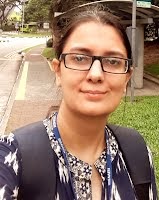2025/02/17(Mon) 14:00 -15:30 一樓演講廳 1F, Auditorium

Title
Discerning the spatiotemporal evolution of cellular organization in microbial communities
Speaker
Dr. Garima Rani (HFSP Cross Disciplinary Fellow, Friedrich Schiller University Jena, Germany)Abstract
Microbial communities were some of the first agglomerations of living beings on the planet but even today the biophysical principles underpinning their spatiotemporal evolution remain mysterious. Here, in an effort to understand the way cells are organized in microbial colonies, we study the intermixing dynamics, colony geometry and topological defects in single founder microcolonies of bacteria, under varying conditions including ambient temperature and substrate properties. For this, we implement label-free tracking of cells as they grow and divide in such colonies, forming progeny domains. We demonstrate that cells from such progeny domains form self-similar enclaves within the colony, displaying a spatial affinity for close relatives and eschewing thorough intermixing. We introduce Shannon entropy as a metric to quantify and compare disparate patterns formed as cells arrange themselves into enclaves, showing that the spatial geometry of intermixing shows a dependence on the level of biological activity in the colony. The enclave interface is also a hotspot for orientational disorder and topological defects proliferate in the region, with their dynamics depending on the growth conditions. Further, 3D structural evolution of these microcolonies also shows interesting dependence on growth conditions, specifically substrate stiffness. Through biophysical modeling, we probe the underlying physical mechanisms driving these organizational features, highlighting the role of factors like division-driven dispersal, the stochastic nature of cell division, cell-cell and cell-substrate interactions. This work sheds light on how bacterial communities self-organize and offers new insights into their evolutionary and ecological dynamics, with potential implications for understanding microbial behavior in natural and clinical settings.
Language
演講語言 (Language): in English